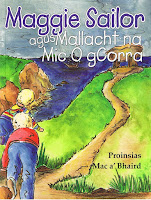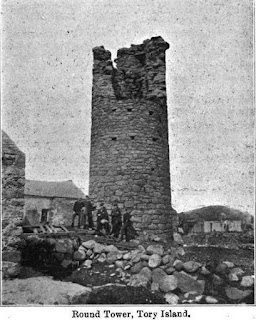Yesterday we looked at an account derived from oral tradition preserved in the archives of the Irish Folklore Commission on how Saint Colum Cille came to bring Christianity to Tory Island. Below is another account derived from the
Life of the saint written in the sixteenth century by Donegal chieftain
Manus O'Donnell. The essentials of the story remain the same in that Saint Colum Cille wins the territory by imitating the miracle of saint Brigid's cloak, but here he has some opposition from other holy men:
 |
| E.Getty, U.J.A. Vol. 1 (1853) |
It is generally understood that Saint Columba, influenced, most probably, by a desire of securing a safe and calm retreat in his own part of Ireland, first introduced Christianity into this remote island of the ocean. Colgan, in the Trias Thaumaturga, introduces what he denominates " the fifth life of the holy Columba,
briefly extracted from the one that Magnus O'Donnell, chief of Tirconnell, wrote out from the original volume in Irish : — translated into Latin and divided into three books." From this work
it may be interesting to extract the account of the dedication of this island. "This servant of Christ,"
says the legend, departed thence, [Gartan,] into the part of the country commonly designated
Tuatha, (the territories,) in the northern plain on the sea coast of Tirconnell. Being there admonished
by an angel of the Lord to cross into Tory, an island in the open sea of those parts, stretching
northward from the mainland; and, having consecrated it, to erect a magnificient church; he proceeded towards it accompanied by several other holy men. On reaching, however, Belach-an-adhraidh, "the way of adoration, — a high precipitous hill that lay in his course, whence Tory is ob-
scurely visible in the distance,— there arose dissension amongst these holy men, with respect to the
individual who. should consecrate the island, and thereby acquire a right to it for the future: — each
renouncing, from humility and a love of poverty, the office of consecrator and right of territory.
After discussing the question in its several bearings, they all assented to the opinion of Columba, that
such a difference was best settled by lot; and they determined on his recommendation to throw their
staves in the direction of the island, with the understanding that he, whose staff reached it nearest,
should perform the office of consecration, and acquire authority over Tory. Each throw his staff, but
that of Columbkille, at the moment of issuing from his hand, assumed the form of a dart or missile,
and was born to the island by supernatural agency. The saint immediately called before him Alidus, the son of Baedain, toparch of the island, who refused to permit its consecration, or the erection of any building. He then requested him, at least, to grant as much land as his outspread cloak would
cover. Alidus readily assented, conceiving the loss very trivial; hut he had soon reason to change
his opinion, for the saint's cloak, when spread upon the ground, dilated and stretched so mueh; by its
divine energy, as to include, within its border, the entire island. Alidus was roused to frenzy by this
circumstance, and incited or hunted upon the holy man a savage, ferocious dog, unchained for
the purpose, which the latter immediately destroyed by making the sign of the cross. The religious
feelings of Alidus were awakened by this second miracle, — he threw himself at the saint's feet asked pardon, and resigned to him the entire island. No further opposition being made, the blessed father
consecrated Tory, and built a magnificent church, which he placed under the control of Ernanus, one
of his disciples, surnamed, from this circumstance, Torracensis. Amongst other things, the saint
commanded that no dog should ever again be introduced into the island.
E. Getty, The Island of Tory; Its History and Antiquities, Part III. Ecclesiastical Period, Ulster Journal of Archaeology, Volume I (1853), 149-150.
Content Copyright © Trias Thaumaturga 2012-2016. All rights reserved.








